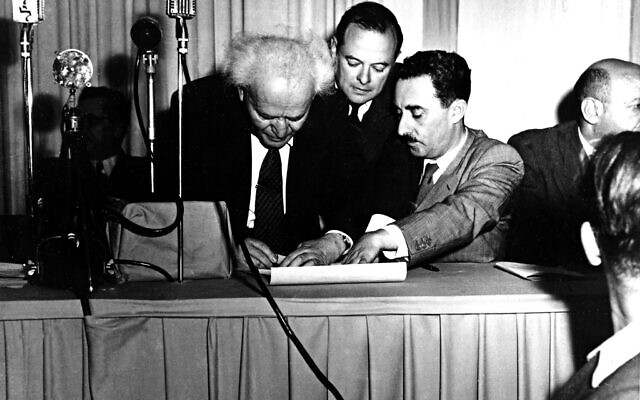OPINION: How the war will end is not history yet, but this is how we got here
From the Canaanites to the British, Jewish News' historian Derek Taylor reflects on how the current conflict is shaped by the preceding centuries.

Over the centuries a large number of nations have ruled in Israel; the Canaanites, Assyrians, Babylonians, Egyptians, Persians, Greeks, Romans, Turks and British are just some of them.
The attraction was originally that the country was a good trading route between North Africa and Europe, between the Mediterranean and the desert. It also became a block between Russia and the Suez Canal, protecting the British trade route to India. The Turks conquered it in 1516 and held it almost continuously until they lost it in the first World War in 1918.
The Balfour Declaration promised Israel a national home for the Jews, but the Arabs who lived there were never happy about this. There was an Arab revolt almost immediately in Jaffa in 1921 when Jewish Marxists started a march against the moderates. The Arabs thought it was against them and attacked the Jews. About 50 of each group were killed.
The Arab leader was Hajj Amin Al-Hussein, (1895-1974) the Mufti (religious head) and he wanted to organise the Arabs to drive the Jews out of Palestine. The Jewish military leader was Vladimir Jabotinsky (1880-1940) who was initially sentenced to 15 years hard labour for organising the Jews, but benefited from an amnesty a few years later.
In 1929 in Hebron there were riots over the Western Wall and 133 Jews were killed and 340 wounded. The Arabs lost 116 members of their community and 230 were wounded.
From 1936-1939 there were further riots which Ben Gurion put down to a fear of growing Jewish economic power, opposition to mass immigration and British approval of Zionism.
After the war, in 1948, Britain gave up the mandate and five Arab armies invaded the state of Israel with the intention of destroying it; Egypt, Iraq, Jordan, Lebanon and Syria. They were all defeated. By resolution 973 the United Nations General Assembly authorised the membership of Israel in the organisation and the Security Council did the same with resolution 49.
Both the United States and Russia voted in favour.
The war ended by armistices but these didn’t always develop into peace. By the terms of the armistice, Israel got 78% of the land and the Arabs the rest, the West Bank. War broke out again in 1967 but only lasted 6 days before the Israelis won a resounding victory. A further war at Yom Kippur in 1973 resulted in over 2,500 Israeli deaths. The Arabs lost about 10,000 killed, 35,000 wounded, 9,000 captured and 2,250 tanks destroyed.
Since then relations between a number of Arab states and Israel have improved. Jordan and Egypt have made peace, the Gulf States were moving towards it, but the United Nations recommendation that Palestine be two states has never been approved.
Over 1,000 Jews were killed by Hamas on October 7 but many Arab states have difficulty in working together. The structure of their governments produce their own problems.
Lebanon, for example, is ruled by a group of three politicians; the President has to be a Maronite Christian, the speaker a Shi’a Moslem and the Prime Minister a Sunni Moslem. They naturally are concerned with the interests of their own communities.
The President of Egypt had to replace the Moslem Brotherhood to gain power, but Hamas are part of that organisation. He will never want the population in Gaza to live in Egypt and become a potential third column.

Thank you for helping to make Jewish News the leading source of news and opinion for the UK Jewish community. Today we're asking for your invaluable help to continue putting our community first in everything we do.
For as little as £5 a month you can help sustain the vital work we do in celebrating and standing up for Jewish life in Britain.
Jewish News holds our community together and keeps us connected. Like a synagogue, it’s where people turn to feel part of something bigger. It also proudly shows the rest of Britain the vibrancy and rich culture of modern Jewish life.
You can make a quick and easy one-off or monthly contribution of £5, £10, £20 or any other sum you’re comfortable with.
100% of your donation will help us continue celebrating our community, in all its dynamic diversity...
Engaging
Being a community platform means so much more than producing a newspaper and website. One of our proudest roles is media partnering with our invaluable charities to amplify the outstanding work they do to help us all.
Celebrating
There’s no shortage of oys in the world but Jewish News takes every opportunity to celebrate the joys too, through projects like Night of Heroes, 40 Under 40 and other compelling countdowns that make the community kvell with pride.
Pioneering
In the first collaboration between media outlets from different faiths, Jewish News worked with British Muslim TV and Church Times to produce a list of young activists leading the way on interfaith understanding.
Campaigning
Royal Mail issued a stamp honouring Holocaust hero Sir Nicholas Winton after a Jewish News campaign attracted more than 100,000 backers. Jewish Newsalso produces special editions of the paper highlighting pressing issues including mental health and Holocaust remembrance.
Easy access
In an age when news is readily accessible, Jewish News provides high-quality content free online and offline, removing any financial barriers to connecting people.
Voice of our community to wider society
The Jewish News team regularly appears on TV, radio and on the pages of the national press to comment on stories about the Jewish community. Easy access to the paper on the streets of London also means Jewish News provides an invaluable window into the community for the country at large.
We hope you agree all this is worth preserving.





















